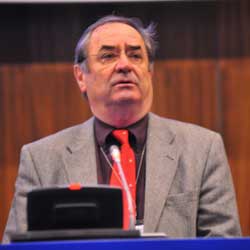
Professor Helmuth Böck wins the prestigious Jan Runermark Award
 |
The Austrian Nuclear Society is delighted to announce that Helmuth Böck has won the 2011 Jan Runermark Award. He was nominated by the Austrian Young Generation for the continuous encouragement and tireless support that he has given to the fields of nuclear energy research and education in Austria over the years.
Helmuth Böck graduated in Technical Physics from the University of Vienna in 1966 and obtained his Professorship in Reactor Safety there in 1979. He was Reactor Manager at the Vienna Research Reactor (TRIGA) from 1967 to 2008. From 1970 to 1978 he worked as an expert on the licensing of the I&C Systems at the Zwentendorf Nuclear Power Plant (NPP). |
Since 1975, he has been a consultant to the IAEA and has worked closely on over 150 research reactor projects. Since 1999, he has also provided the EU with expert guidance on numerous projects.
The Austrian Nuclear Society was founded in 1980 with Helmuth Böck as its first President. The primary aim of the Society was to get the Zwentendorf NPP up and running as it had not been allowed to start operating following the political referendum that took place in Austria in 1978. A second referendum was planned for 1986, but it had to be cancelled due to the Chernobyl accident and Austria’s anti-nuclear policy has remained in place ever since.
Faced with the very special circumstances that the Zwentendorf and Chernobyl referenda had created in Austria, Helmuth worked hard to preserve nuclear competence and knowledge in Austria alive. The foundation of a Young Generation Network in Austria was an important step in this direction. Bearing in mind the sceptical nuclear environment in Austria this has proven to be a very challenging project that has required patience, endurance and great application.
The Young Generation Network was officially founded following a visit by students to the Temelin NPP in 2006. Helmuth Böck gives many lectures on nuclear science at the Atominstitut and tries to motivate students to embrace nuclear technology. He has ceaselessly supported the Young Generation with their various projects, participated at round tables and in field trips and supervised many diplomas and PhD theses. He has, therefore, been a key factor in keeping a certain level of nuclear expertise and knowledge alive in our country.
The Fukushima accident and the prompt initiative that was taken by the YG to establish a public information office – the only one in Austria – suddenly placed the YG and the Atominstitute (ATI) at the centre of public and media attention. This was highlighted by the visit of the Minister of Science and Research on 18 March. With the help of the YG the ATI is now established as the centre of competence for nuclear science and technology in Austria. It has demonstrated that even in a strong anti-nuclear country like Austria maintaining nuclear competence and knowledge is of the highest importance - it cannot be abandoned in favour of other “soft technologies.”
Eileen Radde
Austrian Young Generation
|

